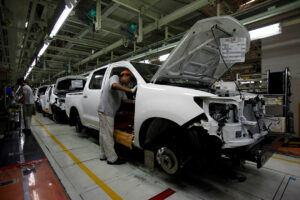By Justine Irish D. Tabile, Reporter
THE GOVERNMENT is negotiating for lower tariffs and forging free trade agreements (FTA) to build a robust automotive supply base, according to the Philippine Economic Zone Authority (PEZA).
“This includes strategic efforts such as negotiating more favorable tariff regimes under Most-Favored Nation (MFN) terms [and] attracting key manufacturers looking to diversify from China under the China +2 strategy,” PEZA Director-General Tereso O. Panga said in a statement on Wednesday.
The Philippines is also expanding its free trade agreement network with key economies like the European Union, India and Canada, the PEZA chief said.
He said the agency is in talks with car companies from India, Taiwan and China.
Last week, the Philippines and European Union finished the third round of negotiations for an FTA in Brussels. The next round is scheduled for October.
Philippine lead negotiator and Trade Undersecretary Allan B. Gepty earlier said there was good progress in text-based negotiations in the third round, a sign that the parties could conclude the talks before the end of President Ferdinand R. Marcos, Jr.’s term.
PEZA said that there were 68 car companies hosted in economic zones (ecozones) as of end-2024, accounting for P100 billion in investments and generating more than 50,000 jobs.
“This performance reinforces the automotive sector’s enduring contribution to national industrial growth and the strength of PEZA’s facilitative ecosystem,” it said.
On June 20, PEZA took part in the 26th regular update meeting of the Toyota Special Economic Zone, during which locators operating in ecozones shared a positive outlook for this year.
The Toyota ecozone is home to Toyota Motor Philippines Corp.’s (TMP) production facility, along with other locators and export suppliers from the Toyota Group, which have investments worth more than P18 billion.
As of May, the ecozone in Sta. Rosa, Laguna had generated 3,208 jobs, while exports reached $87.167 million in the first five months.
“TMP’s approach of embedding its supply chain in the Philippines mirrors PEZA’s own vision of cultivating ecosystems within its ecozones, where manufacturers and their downstream partners can operate seamlessly and competitively,” PEZA said.
“With this enabling support, TMP is bullish about their continued growth in the Philippines, given the strategic importance of the country being Toyota’s 10th-largest global market and fifth-largest market in the Asia-Pacific region,” it added.
Philippine Chamber of Commerce and Industry Chairman George T. Barcelon said attracting car companies would help generate local jobs.
However, the Philippines should work on making its business environment more competitive by addressing issues in the “ease of doing business, power, logistics and labor costs,” he said in a Viber message.
“I would also suggest efforts be put into attracting the supply chains supporting the automotive sector, such as die casting, three-dimensional printing parts and metal machining, among others,” he added.
Ferdinand I. Raquelsantos, president of the Philippine Parts Makers Association, said the Philippines could attract investments in the car sector “if the government will give much better incentives compared with what Thailand, Indonesia and Vietnam provide.”
“These could include free manufacturing land, low corporate taxes and ease of doing business,” he said in a Viber message.
